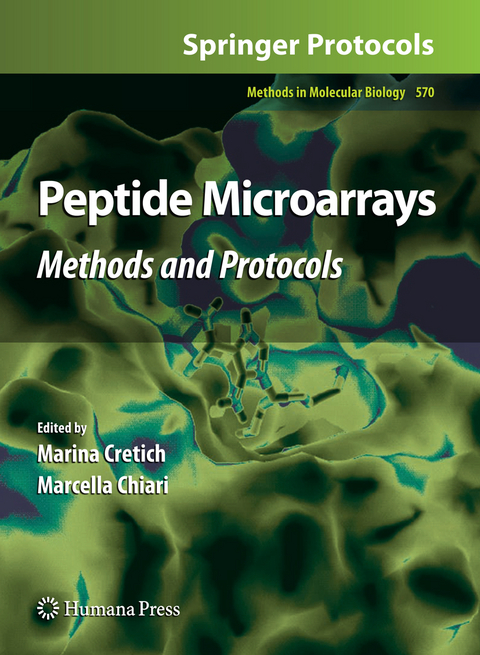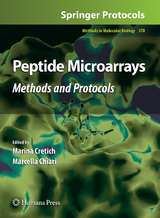Peptide Microarrays
Humana Press Inc. (Verlag)
978-1-60327-393-0 (ISBN)
Due to their versatility, along with the diminishing costs of library synthesis and the growth of commercial support, peptide microarrays will likely expand beyond being just a research tool into an adaptable and powerful platform to be harnessed for wider drug discovery and point-of-care applications. In Peptide Microarrays: Methods and Protocols, experts in the field provide a cutting-edge view of peptide array technology, its applications, and technical issues. After examining how peptides can characterize proteins and clarify, at the amino acid level, the molecular recognition events in which they are involved, the volume goes on to cover topics such as the production and use of peptide arrays for enzyme and binding motifs characterization, epitope mapping, and diagnostics, the newest technological advancements, as well as software and web tools for the design of peptide arrays and for the analysis of output data. As a volume in the highly successful Methods in Molecular Biology™ series, chapters include brief introductions to their respective topics, lists of the necessary materials and reagents, step-by-step, readily reproducible laboratory protocols, and notes on troubleshooting and avoiding known pitfalls.
Authoritative and easy-to-use, Peptide Microarrays: Methods and Protocols promises to serve scientists with its unique insights and novel solutions in peptide array technology in order to advance this vital field.
Exploring and Profiling Protein Function with Peptide Arrays.- Peptide Arrays for Enzyme Profiling.- Using Peptide Array to Identify Binding Motifs and Interaction Networks for Modular Domains.- Molecular Simulations of Peptides: A Useful Tool for the Development of New Drugs and for the Study of Molecular Recognition.- Applications.- Synthesis of Peptide Arrays Using SPOT-Technology and the CelluSpots-Method.- Rapid Identification of Linear Protein Domain Binding Motifs Using Peptide SPOT Arrays.- Characterization of Kinase Target Phosphorylation Consensus Motifs Using Peptide SPOT Arrays.- CelluSpots™: A Reproducible Means of Making Peptide Arrays for the Determination of SH2 Domain Binding Specificity.- High-Density Peptide Microarrays for Reliable Identification of Phosphorylation Sites and Upstream Kinases.- Epitope Mapping of Human Chromogranin A by Peptide Microarrays.- Antimicrobial Peptide Arrays for Detection of Inactivated Biothreat Agents.- Mapping Functional Prion–Prion Protein Interaction Sites Using Prion Protein Based Peptide-Arrays.- A Designed Peptide Chip: Protein Fingerprinting Technology with a Dry Peptide Array and Statistical Data Mining.- Technological Advancements.- Peptide Microarrays on Bisphenol A Polycarbonate.- Self-Assembly of PNA-Encoded Peptides into Microarrays.- A Novel Combinatorial Approach to High-Density Peptide Arrays.- Polypyrrole–Peptide Microarray for Biomolecular Interaction Analysis by SPR Imaging.- The Peptide Microarray-Based Assay for Kinase Functionality and Inhibition Study.- An Advanced Application of Protein Microarrays: Cell-Based Assays for Functional Genomics.- Profiling the Autoantibody Repertoire by Screening Phage-Displayed Human cDNA Libraries.- Software/Web Tools and Data Analysis.- Visualisation andPre-processing of Peptide Microarray Data.- Web-Based Design of Peptide Microarrays Using ?PepArray Pro.- Qualitative and Quantitative Analysis of Peptide Microarray Binding Experiments Using SVM-PEPARRAY.- PASE: A Web-Based Platform for Peptide/Protein Microarray Experiments.
| Reihe/Serie | Methods in Molecular Biology ; 570 |
|---|---|
| Zusatzinfo | 2 Illustrations, color; 116 Illustrations, black and white; XII, 434 p. 118 illus., 2 illus. in color. |
| Verlagsort | Totowa, NJ |
| Sprache | englisch |
| Maße | 193 x 260 mm |
| Themenwelt | Informatik ► Weitere Themen ► Bioinformatik |
| Studium ► 2. Studienabschnitt (Klinik) ► Humangenetik | |
| Naturwissenschaften ► Biologie ► Biochemie | |
| Naturwissenschaften ► Biologie ► Mikrobiologie / Immunologie | |
| ISBN-10 | 1-60327-393-X / 160327393X |
| ISBN-13 | 978-1-60327-393-0 / 9781603273930 |
| Zustand | Neuware |
| Informationen gemäß Produktsicherheitsverordnung (GPSR) | |
| Haben Sie eine Frage zum Produkt? |
aus dem Bereich




